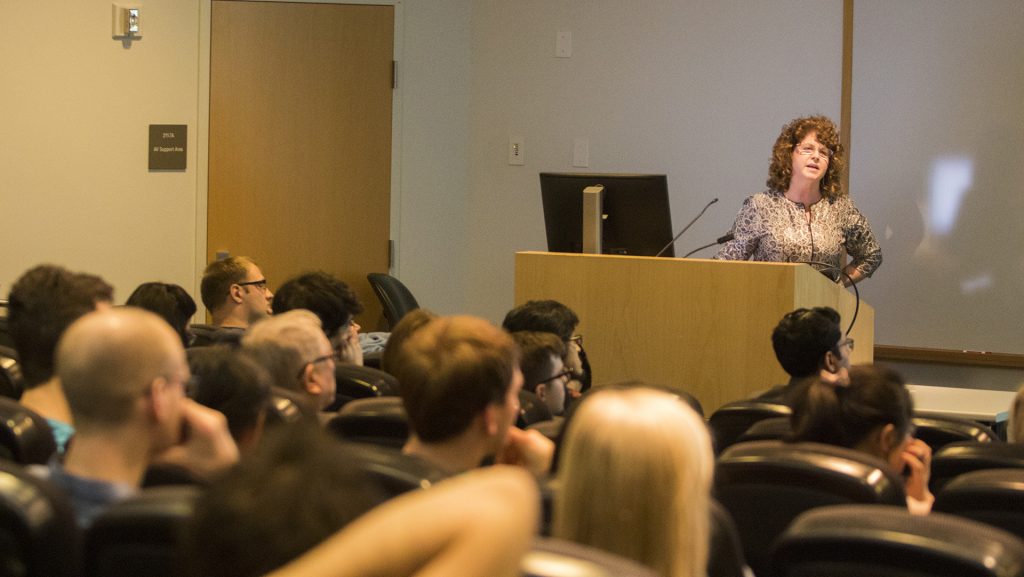To laypersons, it might not seem obvious to search for the evolutionary origins of human intelligence in the genetics of Huntington’s disease, or why doctors would want to test novel treatments for the cognitive symptoms of Parkinson’s disease by measuring the reflex speeds of lab mice.
But University of Iowa neuroscience researchers who presented their work at Monday’s 2018 Health Sciences Research Week Faculty TED Talks say these are just a few of the unexpected links that help them understand how the human brain works — and how they can fix it when it doesn’t. The event took place at the Medical Education & Research Facility.
“The human brain is the most complicated biological structure in the known universe, and we’ve only just scratched the surface on how it works, and why it doesn’t,” said Samuel Young, an associate professor of anatomy/cell biology. “The real challenge that [we face] in the neuroscience field is how do we take our research, and turn it into discovery?”
Often, the discoveries that stemmed from the presenters’ research were surprising enough they themselves were caught off-guard, Young said.
Peggy Nopoulos, a UI professor of psychiatry who presented her research on Huntington’s disease, said she was skeptical the first time she was presented with the idea that the disease might somehow be linked to increased mental ability.
“I was having a conversation with [Italian Huntington’s disease researcher] Elena Cattaneo, and she asked me, ‘Do you think [children at genetic risk of developing Huntington’s disease] are the best, the most capable of their group?’ And of course, I thought in my head, ‘Crazy lady,’” she said. “But then I looked more into it, and it turned out that’s what evolutionary biologists were talking about.”
Nopoulos said the neurological and psychiatric dysfunction in Huntington’s disease stems in part from the excessive presence of glutamine, an amino acid, in the brain. While too much glutamine is associated with the disease, she said, higher amounts are also correlated with higher IQs.
This means having a genetic risk for Huntington’s disease — typically a condition of middle age — was in fact an advantage in early human history, when people seldom lived long enough to develop it, she said.
“Sometimes, especially in the human brain, ability accompanies liability,” she said.
Nandakumar Narayanan, a UI assistant professor of neurology, detailed how impaired movement — especially that in genetically altered mice — became the crux of his research into the intricate factors that link dopamine and brain waves to the psychological and mental impact that Parkinson’s disease has upon patients.
His “first clue,” he said, lay in observing the symptoms of one of his very first patients — a woman whose Parkinson’s disease had left her with cognitive symptoms such as hallucinations, delusions, and forgetfulness.
In addition to these cognitive symptoms, “she had profound difficulty with motor tasks,” Narayanan said. “And I realized, this is something I can measure.”
Eventually, by comparing brain scans of mice genetically altered to have Parkinson’s-like symptoms, he and other researchers found that the rodents who performed worst on reflex-speed tasks also suffered from severe delta brain wave disruptions, he said.
After the finding was replicated in humans, his team was able to discover that brain implants that regulated the frequency of the delta brain wave alleviated some of this cognitive dysfunction in patients severely afflicted by Parkinson’s disease.



